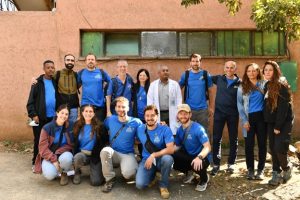
The youth are successors of the country. So, to unleash their potentials facilitating education and training is essential.
Side by side with this, creating job opportunities are essential. Considering this, since 2009, the government has allocated close to 10 billion Birr for revolving fund to states. This way it has been rendering job opportunities for thousands.
Derje Admassu is Youths’ Organization Department Head under the Office of Women, Children and Youth in the Northern Shewa Zone in Debre Berhan town.
As to him, while creating enabling environment towards job creation, the office considers the interest of the youth. And the committee will make assessment whether the new jobs are feasible or not. When the type of the jobs are ratified as feasible, credit facility to the organized youths enjoys a green light.
However, in the initial phase, if the enterprises fail to meet their objectives, the youth will be advised to shift focus to other profitable jobs. Consultation services are also provided to them.
Production and service provision, dairy farming, livestock fattening, wood works, garment and clothing, food and beverage are among the fields the youths are engaged in.
According to Dereje, based on the second Growth and Transformation Plan (GTP II), the northern Shewa zone has created permanent and contemporary job opportunities to 246 thousand youth since 2008.
On the other hand, from 2009 to 2011 about 1,400 enterprises benefited from the revolving fund and created jobs to 3,500 youths. In addition to these, in the year 2012, about 1,500 enterprises have managed to create jobs.
The enterprises obtain 25 percent of loan from the national revolving fund and the remaining 75 percent loan. The Amhara Saving and Credit enterprise provided the remaining loan. Based on the Amhara Regional Government instruction, in the GTP II, the zone has planned to create jobs for 97 thousand youths. The credit money will be drawn from the revolving fund and the regular loan service. Nevertheless, till to date, only 65 thousand unemployed youths are registered.
Before they obtain the credit, the beneficiaries of the credit facility must fulfill the criterion. Among others they should show the amount of their capital (not the beginners) and must have the capacity to refund the money through their saving balance.
Getting loan through formal ways from the government coffer is more often hamstrung by bureaucratic hurdles. Hence, to overcome the challenge, the Amhara Credit and Saving Enterprise has put in place a program to get the loan in a simple way.
Usually, the enterprises engaged in cattle fattening and dairy allocate the loan money for purchasing inputs such as medicines and others to their livestock.
It should be understood that each enterprise must recognize that it should work with fierce competition with other counterparts.
Effective and efficient enterprises refund the loaned money in time and secure additional loans. Others which work below the average pace refund the loaned money in sluggish manner. In this case they might fail to secure additional loan.
According to Dereje, about 130 enterprises refunded the loaned money on time and only very few had failed to do so. The refunding task in the zone is said to be 99 percent cost effective. The refunding accomplishment has surpassed others zones by 3 percent.
The Northern Shewa has various Wordeas, under its administrative mandate which have diversified agro ecological zones. The climate conditions are categorized under cold, mild and arid areas.
The Debre Berhan area is well known when it comes to its richness for cattle fattening and dairy farming. Farmers who engage in the livestock production are educated up to college level. And each day the dairy farmers’ enterprises supply 30 thousand liter milk to the Addis Ababa market.
In the future, they are networked with the cooperation of milk suppliers in the Oromia State to cover the entire city’s milk demand.
A village 29km away from Debre Berhan town stands out for its cattle fattening works and the farmers go up to Gonder to bring genetically better animal species. After fattening they supply their sought-after heads of cattle to market.
Shewa Robite is found in the Northen Shewa zone. It is climatically hot and known for its irrigation farming. It produces fruits and vegetables three times a year.
Minjar area is also found in that state. It is characterized by sweltering air. It is famous for poultry. Menze is one of the coldest places in the area. It is marked for sheep rearing. In these areas youths have organized themselves and established their enterprises and engaged in the mentioned schemes. Each enterprise is composed of five members and has a good reputation in refunding the money secured by credit.
Enterprises engaged in fattening animals and poultry face challenges due to animal diseases. To overcome the problem, they spend their money on purchasing medicines.
On the other hand, though there is excessive number of sheep in the Menze areas, due to the poor quality of the local species their productivity is very less. Hence, hybridizing the animals with exogenous species is well underway in collaboration with the Agricultural Institute of Debre Berhan.
As it is known, Ethiopia is one of the populous nations in Africa, the majority of whose population comprises youths. This segment of the society needs education, training, health facility and job. If the nation accords them with the aforementioned virtues, they will be active in economic engagements. But creating job is not a simple task. It needs both private and public investment. But the available investment is not at a satisfactory level to meet the need towards job creation. Hence, mobilizing, revolving and other funds for job creation is essential.
The Ethiopian Herald Sunday Edition 17 Novebmer 2019
BY ABEBE WOLDE GIORGIS





